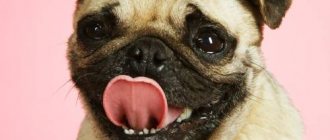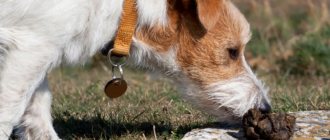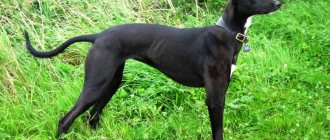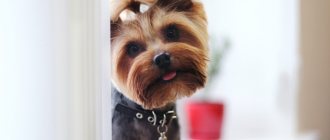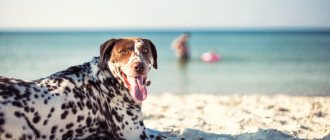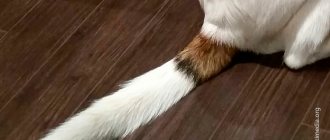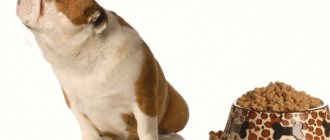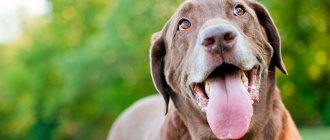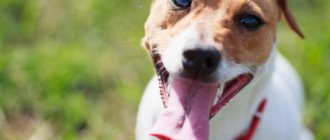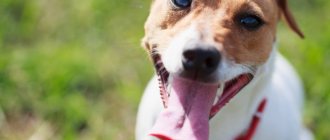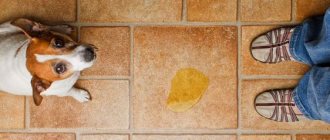The owner often notices that his dog eats feces. This phenomenon is called coprophagia and most often occurs in dogs. The reasons why she does this may lie in the pet’s poor health, its bad habits, and psychological problems. Is this good or bad, and how to stop a dog from eating excrement? We’ll talk about this later.
Reasons why a dog eats feces
Dogs, by sniffing the feces of other animals, obtain important information for themselves. They can accurately determine which sex the feces belong to, whether the female is in heat, and how long ago the animal ran through the area. However, if, when sniffing, the pet eats other people's excrement, then the owner should pay attention to this and find out the reason for this behavior.
Physiological
Any deviations in the dog’s well-being and health can make it want to eat feces. It doesn’t matter who it belongs to: her own, a cat, a person or another animal.
Why does your pet eat poop:
- The dog has helminths. Infection with parasites can cause her to have a perverted appetite. This symptom is accompanied not only by eating poop, but also small stones, earth, wood chips, coal and other objects.
- Disturbances in the gastrointestinal tract, infections, syndrome of impaired absorption of nutrients in the intestines. These deviations are accompanied by increased flatulence, foul-smelling diarrhea, and vomiting in the dog.
- Lack of enzymes, vitamins or some microorganisms in the body. By eating feces, the pet tries to make up for their deficiency.
On a note! Feeling hungry can also make your dog want to eat other people's poop. If the gap between meals is large, then in this way it satisfies the desire to eat.
Psychological
If the animal is completely healthy, but still eats feces, then perhaps the reason lies in its psychological state. Any deviation in this area is fraught with eating excrement:
- The dog is jealous of another dog, cat or animals in the house. In this case, she eats their feces to get rid of the smell of her rivals.
- Jealousy of a newborn child because the owners pay more attention to him can force the dog to eat feces from the baby's potty.
- A puppy eats its own poop if it imitates its mother. From birth, the female takes care of the hygiene of her brood. This habit is passed on to puppies and lasts up to 3 months.
- An adult dog can imitate a person who cleans up its feces every day. The animal adopts the behavior of the owner and maintains cleanliness in its own way.
- Dominance among animals. Dogs that feel superior to other animals may force weaker animals to eat their own excrement. Thus, weaklings recognize him as a leader and submit.
- Excessive severity of the owner, who scolds the dog for leaving piles on the floor, may force him to hide his feces by eating it. Most often this happens if a person rarely walks the dog or gives it little time to relieve itself.
- Competition for attention and food, especially if there are a large number of dogs in the house. This forces the pet to eat the first piece found on the floor, without thinking about what it is.
Stress can also make your dog want to eat poop. It can occur after moving, loneliness, boredom, after performing at a festival or competition, etc.
Why does he eat other animals' feces?
Dogs can eat not only their own excrement, but also other animals that live in the house or meet on the street.
- Cat feces contain protein and microelements that your dog will enjoy. That's why she eats cat feces.
- The feces of herbivorous animals, for example, cows, horses, goats, contain fiber, which affects digestion. By eating it, the dog makes up for its lack.
- Human excrement will also appeal to the animal. They contain nutrients and protein.
Interestingly, horse excrement helps your pet get rid of helminths. So she self-medicates.
Important! Whatever the reason that forces a dog to eat its own or someone else’s feces, this pathology can lead to health problems.
Quite often, manifestations of coprophagia in dogs are observed when the balance in the diet is disturbed. The animal receives:
- fried or salty foods;
- the menu contains only porridge or only meat;
- excess food, which leads to bloating and gradual obesity;
- feeding with cheap food from unknown manufacturers, which contains unknown ingredients;
- harmful foods, for example, sweets, forbidden fruits.
Facts about dogs that eat poop
When it occurs in puppies, coprophagia is usually considered part of the process of exploring the world around them. For most puppies, just a sniff is enough, but some will want to, like human children, try everything to their teeth. One strange fact: dogs rarely eat soft, poorly formed stool or diarrhea. They seem to be most attracted to hard stool. In particular, frozen feces are a pleasure to swallow! In his study, Hart made several other observations about why dogs eat feces:
In families with two dogs, coprophagia occurs more often
- Coprophagia is more common in families with multiple dogs. In one-dog homes, only 20 percent of dogs have this habit, while in three-dog homes, the habit is much more common.
- Poop eaters are no more difficult to train than any other dog.
- Females are more likely to eat feces, while unsterilized males are less likely to eat feces.
- 92% of poop eaters want fresh food.
- 85% of poop eaters do not eat their own poop, but prefer the stool of other dogs.
- Greedy dogs that steal food from tables usually eat poop.
Why is coprophagia dangerous?
There are three types of coprophagia in dogs, depending on what kind of feces the pet eats:
- autocoprophagy - the dog eats its own feces;
- intraspecific coprophagia - the pet eats the feces of other dogs, street or living together;
- interspecific coprophagy - the dog eats the excrement of other fauna, including human excrement.
Interesting! The desire to eat feces occurs in almost all dog breeds. The only breed that neglects this “delicacy” is the miniature poodle.
Eating excrement will not lead to anything good. This deviation must be combated. Why is coprophagia dangerous for a dog?
- Infection with intestinal parasites that are found in feces. In one of their developmental phases, helminths leave the host’s body to move around in the surrounding nature. This leads to their entry into a new organism, intense infection and accumulation in a ball.
- Infection with parvovirus enteritis. The dangerous disease is transmitted through eating the feces of a sick animal or through contact with objects contaminated with the virus. Most often, puppies under 1 year of age with unstable immunity are affected.
- Infection with leptospirosis is jaundice. The virus attacks the dog's liver. If treatment measures are not taken, the animal may die within two days from the moment of infection.
- The occurrence of toxoplasmosis. A dangerous infection transmitted from dog to person. An old pet may not survive the disease due to weak immunity.
According to statistics from veterinarians, only 16% of 100 dogs studied suffer from coprophagia on an ongoing basis, 84% of animals eat feces periodically.
Contacting a veterinarian
If within 1-2 weeks there is no positive result in weaning your pet from eating feces, you need to contact a veterinarian. Perhaps the factors that provoke the emergence of unusual gastronomic addictions are much more serious than it seemed.
If your puppy eats feces, do not immediately panic and take drastic measures. Perhaps this is a method of getting to know the outside world. You need to watch the pet for some time, and only if the dog grows up, but does not change its habit, you need to help it with this. If an adult is addicted to eating feces, this is a reason for immediate action.
What to do if your dog eats feces
If the owner notices that his dog is eating excrement, then action must be taken immediately. In this case, simply scolding her is inappropriate. To begin with, just say: “Ugh!” and pull the pet away from the pile.
Developing the habit of not eating poop is a complex process. First you need to establish the cause and eliminate it.
Nutrition correction
If your dog eats feces, it may be lacking something in its diet. This often happens when feeding cheap dry food, which has an unbalanced composition. As a rule, they contain more plant components than meat.
Protein is the main source of energy for dogs. Therefore, choose quality food for your pet. When creating a menu of natural products at home, also make sure that your dog receives all the vitamins and minerals.
Recommendation! Get tested at a veterinary clinic to determine what substances your pet is lacking.
Recommendations for nutrition:
- use food with the maximum amount of protein and low carbohydrate content;
- add iron capsules to your diet;
- for 7 days, add vegetable oil to the food (dosage 15 ml of oil per 4.5 kg of animal weight);
- feed the animal 3-4 times a day in small portions to avoid starvation;
- add meat emulsifiers and pancreatic enzymes to the food, which can be purchased at a veterinary pharmacy.
Cleanliness
Timely removal of feces will help prevent your dog from eating excrement.
- Take a plastic bag with you on your walk.
- Block the dog's access to the tray where the cat goes to the toilet.
- Remove the potty area to prevent your dog from eating baby poop.
- Watch when the puppy goes to the toilet and clean up after him, without giving him the opportunity to eat his excrement.
Rules for a walk
Walk your dog on a leash, especially if there are other dogs nearby. Pay close attention to what your pet smells or puts in its mouth. To avoid eating feces, it is better to put a muzzle on your dog.
Teach your dog the “Foo” or “No” command. This will help stop it in time.
Examination and tests
If your dog constantly eats feces and no measures help, then contact your veterinarian. Taking tests, consulting and examining your pet will help identify a hidden threat and detect an internal disease.
Carry out comprehensive treatment against helminths and other parasites.
On a note! Coprophagia disappears after treatment.
Use of drugs
When there are two or more animals in the house, it is recommended to use special drugs that change the taste of feces.
Some owners treat the stool with an emetic substance or sprinkle it with hot pepper, horseradish, mustard, and garlic. Sometimes the doctor recommends injecting Apomorphine (causes vomiting, nausea) or a small dose of hot pepper sauce into the stool with a syringe. This imparts a disgusting taste and discourages dogs from eating it.
Means for oral administration - table:
| Drug name | Action | Dosage |
| Excel Deter | The drug contains yeast and substances that cause bitterness in stool. It helps normalize digestive processes. Can be given to puppies and old dogs. | 1 tablet for dogs up to 4 kg body weight; 2 tablets – body weight up to 20 kg; 3-4 tablets – dog weight more than 25 kg |
| Nutria-Vet | Vitamin supplement, one tablet is given to those who eat feces, the second to those whose feces are eaten. | 1 tablet per 10 kg body weight. |
| Deter | The taste of excrement becomes bitter. Contains plant components. Can be given for preventive purposes. | 1 tablet per 5 kg of animal. |
| Forbid | Powder that imparts bitterness to stool. They add it to the animal whose feces the dogs eat. | Given with meals. Dosage on the package. |
| Enzymes | Means for processing meat feed. Improves digestion, restores metabolism, discourages cravings for eating feces | Give daily at every feeding. Dosage on the package. |
The drug Pet Block Repellent is also effective - it is an aerosol for external use. It is sprayed on feces to repel dogs. Can be used at home and does not cause an allergic reaction in people.
Important! Never scold, yell at, or poke your pet if it makes a puddle or pile of poop. Punishment will lead to him hiding them.
General Tips
When teaching an adult dog not to eat feces, owners often make mistakes. And the efforts come to naught. The following recommendations will help you avoid mistakes:
- do not scream, do not hit - such training of a dog is useless, it will aggravate the situation and ruin the relationship, and the intimidated pet will continue the “dirty deeds”, but in secret;
- walk, train and play with the dog every day;
- While the pet is weaning itself from eating feces, a muzzle is put on it during walks;
- if you catch an animal eating feces, do not chase it, do not scold it or coo;
- Don’t poke your muzzle into the piles - the dog won’t understand what’s going on, and its sense of smell will weaken, plus in the future the little tail will get rid of excrement on its own.
Eating feces is an unpleasant habit, but not fatal. With the right approach, it will disappear in 2-3 weeks. If you can’t cope on your own, turn to a dog handler.
How to stop your dog from eating poop
To wean a dog from a bad habit will require patience and persistence from the owner.
- Teach your dog obedience. If you notice that she is eating poop, approach quietly and say loudly: “Ugh!”, “No way!” Or clap your hands so that she understands that there is danger. Then call her over.
- When walking, pull the leash every time you see that she is interested in obscenity.
- While walking, keep your dog's mouth occupied with a toy or stick. Don't allow her to be released.
- Provoke the situation yourself. Find piles of animal droppings and pull back the leash, preventing your dog from touching them.
- Use the negative reinforcement method. Its essence is to pre-treat all found poop with pungent or emetic substances (pepper, bitter sauce, vinegar). Then walk your pet along this route. After the first sample of inedible feces, the dog will not eat the rest.
- When eating your own feces, distract your dog and call him to you. Give her a treat or toy. It is important to switch her attention to another object.
- After your pet goes to the toilet, attract her attention with some command or draw her along with you.
On a note! Any task completed correctly should be rewarded. Praise your dog, give him a treat, pat him on the head.
Coprophagia, or poop eating, is an unpleasant pet behavior. It can lead to infection with various infections, bacteria and worms. To protect the dog, it is necessary to establish the cause of this behavior and correct the situation. Training the animal, the owner’s persistence, and the use of special means will help the dog get rid of this bad habit forever.
General recommendations
Solving the problem of a dog eating feces requires special attention. To combat this situation, it is advisable to simultaneously use several methods, but their combination in each case must be selected individually, taking into account the characteristics of the animal’s character. In this case, it is necessary to minimize the possibility of the pet tasting feces.
- create a diet together with a veterinarian;
- monitor the health of the animal;
- spend more time with the dog;
- clean the apartment or house (with the surrounding area and enclosure, if there is one);
- If you have other pets, exclude the dog from access to places where they defecate and keep them clean.
Coprophagia is not a disease, but a consequence of problems that the pet has. This habit cannot be left unattended by simply washing the dog and giving it deworming medication. After all, failure to contact a veterinarian in a timely manner can lead to irreparable consequences.
Eating Poop Is Normal for Dogs and Puppies
For some species, such as rabbits, consuming feces is a completely normal way to obtain essential nutrients.
In fact, if you prevent rabbits from doing this, they will develop health problems and the young ones will not be able to thrive.
Luckily, dogs don't have to get their nutrients by eating feces. This is, however, normal, natural behavior at some stages of a dog's life.
Mother dogs will lick their puppies to encourage them to remove and clean up their feces during the first three weeks. Puppies will also naturally engage in this behavior by eating both their own fecal droppings (known as autocoprophagy) and other dogs (alkydoprophagy), as well as cats and other animals.
Some dogs find horse manure and goose droppings particularly attractive.
Eating their own feces is harmless, but consuming other animals can cause health problems if the feces are contaminated with parasites, viruses or toxins. In most cases, this behavior will disappear before the puppy is nine months old.
Treatment of the disease
Based on the diagnostic results, the necessary treatment is prescribed. Addressing underlying medical problems usually reduces the incidence of the disease:
- Based on existing problems, a nutritionist will help adjust the dog’s diet.
- Enzyme therapy will improve the process of food digestion.
- A course of probiotics will help improve your intestinal flora.
- In case of underfeeding, increase the calorie content of the diet and the amount of food eaten.
- Special vitamin and mineral complexes will eliminate the deficiency of microelements.
- Sedatives are prescribed in case of excessive excitability, fear or stress.
Hunger
One of the most common reasons that make a dog show interest in feces is hunger. The roots of the situation go back centuries. The distant ancestors of dogs ate their own feces and the feces of other animals in order to survive.
Coprophagia, the scientific name for the phenomenon accompanied by the eating of feces, helped canines replenish the lack of vitamins and minerals in the body, as well as simply survive in the event of a lack of food.
The feeling of hunger is unusually strong, so if an animal greedily eats feces during a walk, it is necessary to reconsider the pet’s diet. Perhaps the body lacks nutrients and the animal instinctively seeks an additional source.
Diagnostic methods
First of all, it is necessary to establish whether there are medical causes of coprophagia. To do this, the dog needs to be thoroughly examined.
First, the doctor must ask the owner about the lifestyle of his pet, whether he has chronic diseases, and whether there are any behavioral characteristics.
The medical history should include the following information:
- where the animal was purchased, what is its pedigree;
- is the frequency of cases of coprophagia high, is there a connection with lifestyle;
- whether there are other animals in the family.
To determine the causes of coprophagia, the animal must be diagnosed as follows:
- Diagnosis of the gastrointestinal tract will allow you to exclude diseases of the liver and pancreas, identify the presence of intestinal failure, enzymatic deficiency;
- A blood test will allow you to understand what microelements the body lacks;
- Diagnosing the dog’s psycho-emotional state will help determine whether the animal has psychological problems.
